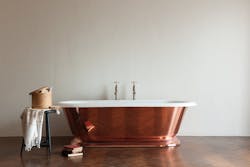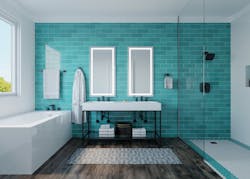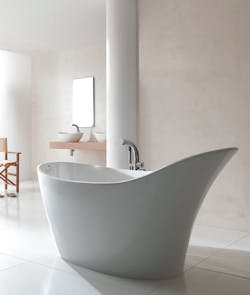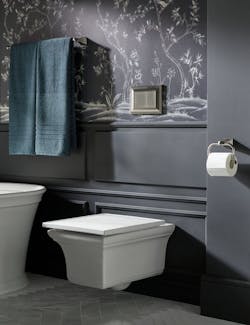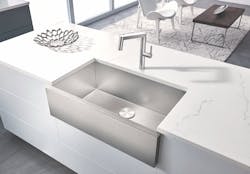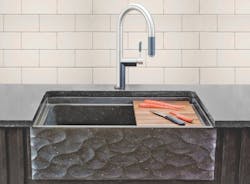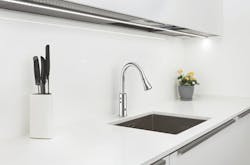The Latest Trends in Kitchen and Bath Fixtures
When it comes to who’s driving new trends in kitchen and bath faucets and fixtures, there’s no question: It’s consumers. Savvy manufacturers seek to please them by fulfilling everyday needs and by anticipating conveniences that consumers may not even have imagined possible. Today’s new products marry tech-based bells and whistles with the aesthetic “bling” of contemporary, streamlined shapes in a wide range of finishes and colors.
MODERN AND TECH-BASED
Noelle Giblin, senior director of product–faucets for Lixil Americas, believes the popularity of contemporary style lies in its bringing a feeling of calm to the environment, providing “an inviting, approachable setting for the user.”
Beneath the modern visual attractors are a wide range of technologies focused on bringing time savings and convenience to the homeowner. “The development of new technologies in kitchen and bath products is being driven by consumer demand for products that offer reduced maintenance and innovative features that simplify their everyday lives,” Giblin says, “whether it’s a self-cleaning toilet or an electronic kitchen faucet that can measure out water for the user on demand.”
Technology is a major factor in progress on several big-picture concerns that affect kitchen and bath products. Lea Mendoza, design manager for Toto, points out that drought is affecting a majority of the country. “As of January of this year, abnormal dryness and drought are currently affecting over 167 million people across the United States, which is about 53.9 percent of the country’s population.”
Cindy Woodhead, sales manager for California Home Builders, in Canoga Park, Calif., notes that in California, most homes are eco-friendly by regulation already. Giblin adds that even in areas unaffected by water regulations, “more homeowners are looking for water-conserving toilets, faucets, and showers, as confidence in their performance continues to grow.”
Vero Beach, Fla.–based Patricia Davis Brown, owner of Patricia Davis Brown Designs and author of design blog
Dig This Design, thinks that every manufacturer of plumbing and appliances is going greener because of consumer demand. “Today’s choices are engineered to not sacrifice the quality of the product,” she notes. “In fact, they work better.”
Products that address aging and physical challenges are also created with aesthetic and universal appeal such that they benefit anyone who uses them. As Giblin explains, “ADA-compliant handles and touchless sensor technology are more ergonomic for all users.”
Here are highlights of what’s trending in bath and kitchen faucets and fixtures by category.PERSONALIZING THE SPA BATH
In homes across the market, the bathroom is expected to serve as a spa and retreat, with good looks and high function to match.
Faucets. Classic finishes, such as polished chrome, brushed nickel, and satin nickel, are most in demand, Giblin says. “But a lot of interesting, new metal finishes are emerging to support the trend toward warm, minimalist styling—from the current trend with matte black and warm golds, to up-and-coming matte metallic coatings,” she observes. Mendoza agrees. “Although chrome will always remain the classic go-to, brass and matte black are popular trends.”
When it comes to modern styling, industrial looks are gaining ground. “While skewing a bit masculine, the industrial look can fit nicely in either contemporary or traditional settings,” says Steven Weinberg, VP of sales at California Faucets.
Single-control models and collections with mix-and-match spouts and handles top the list, according to Kohler’s Eric Moore, senior interior designer, and Ericka Sprangers, interior designer. High-necked faucets are most popular for master baths, Brown says. Powder rooms can be outfitted with more trendy faucet finishes and decorative sinks.
Giblin adds, “Touchless and touch-on/off faucets have gained widespread popularity because they offer benefits in cleanliness and ease of use beyond just helping the mobility-challenged.”
Increased convenience is at the heart of Kohler’s Konnect, a platform that allows consumers to personalize their experience with Kohler products through app presets that automate everyday tasks. Users can operate features of an intelligent toilet, run the shower, fill the bathtub to a desired temperature, and control the kitchen faucet by using voice commands.
Bath sinks. Giblin cites under-mount and vessel sinks in a variety of materials as popular choices. “Rectangular, moderately sized under-mounts are functional, provide a clean look, and maximize counter space. For those who want to make a statement or have the sink serve as a design focal point, vessels are a popular way to go,” Giblin says.
Mendoza adds that under-mounts in floating vanities project a contemporary vibe and a minimal look that is easy to clean around. Moore and Sprangers have observed that large trough sinks are also in demand.
Bathtubs. Experts are divided on whether to tub or not to tub. Woodhead says, “In higher-density and luxury multifamily homes, very large showers are trending. In single-family homes, buyers, especially those with families, expect a nice soaking tub. We are seeing acceptance of large, contemporary showers in second and third baths, and especially in homes with large downstairs bathroom suites designed for older Boomers.”Brown believes the configuration is ultimately a personal choice. “Either you crave a tub bath, like me, or you don’t,” she says, noting that she rarely designs a master bath without a tub. Acknowledging the spa trend in baths, she says, “My clients want a tub experience, like a tub room. Soaking tubs are not only beautiful, but in high demand.”
Manufacturers are covering all the bases, offering bathtubs in a range of sizes, some with smaller footprints around
66 inches long for more compact spaces.
Weinberg states that designers are getting away from creating tubs surrounded by walls and tile. “This free-standing look is further enhanced by a love of freestanding tub fillers. Installations benefit most from tub fillers with strong roughs that don’t require visible bracing,” he says. “Single-hole/leg tub fillers give a bold, minimalist statement to the freestanding look, but there is a common trade-off: The flow rate is significantly less. As for finishes, matte black is increasingly appearing as a nice alternative to the same old basic finishes like chrome.”
Showers. Simplicity is trending in the shower as well. “While still being specified in parts of the country, ‘car wash’ showers are not as popular, and body sprays are no longer an important sought-after item for the luxury shower,” Weinberg asserts.
Experts indicate that the most popular configuration is a stationery showerhead combined with a handheld showerhead. “The handheld showerhead is a must for cleaning the space,” say Moore and Sprangers. “Consumers are interested in different spray options, along with digital thermostatic valves and interfaces.” The next step up would also include an overhead rain showerhead.
Woodhead notes, “We are seeing smart showers, which allow consumers to set specific temperatures and spray patterns that are customized to their tastes. Remote-start allows for turning the shower on from another room so it can warm up before getting in.”
Mendoza believes that creating a spa experience for many involves adding products with key relaxation, health, and beauty features, such as steam showers, filtration systems, and massaging sprays.
Toilets. According to Moore and Sprangers, concealed or skirted trapways, comfort heights, good performance with flushing power and cleanliness, and quiet-close seats are the features in best-selling toilets today.
As commercial styling trickles down to residential, wall-hung toilets are increasing in popularity, Mendoza says. “They work well for bathrooms with limited space and are easier to clean since they are off the floor and can be easily mopped around.”Rimless toilet technology, which Mendoza says was developed by Toto, also is becoming the new standard. Rimless bowl designs make for easier cleaning and improved hygiene as they remove the primary area in which bacteria and lime scale build.
Woodhead notes that quiet-close toilet seats and electric toilets with lots of bells and whistles are favorites in high-end and contemporary luxury homes.
Gaining in demand are products with tech features that respond intuitively and automatically to the user—including automatic flushing and open/close lids.
Finally, taking a cue from European tradition, Mendoza notes that “the American public is starting to understand the ergonomic, hygienic, and environmental benefits that an integrated bidet system provides.”
Convenience In The Kitchen
In the kitchen, commercial design continues to be influential, tempered by color and personal touches.
Faucets. Contemporary styles are proliferating but are no longer limited to classic finishes of chrome, nickel, and stainless steel. “A color movement is afoot, with more and more designers making a splash by specifying gold-tone finishes,” Weinberg says. Brown tempers the finish frenzy by adding, “Even though there is a lot of buzz about mixing metals, I find polished chrome the favorite.”
Woodhead disagrees, noting that stainless and chrome finishes are still the most popular, with black sinks and fixtures are also just beginning to see more mixed finishes in kitchens,” she observes.
Giblin sees high-arc, pull-down faucets winning out over two-handle and pull-out styles: “They offer increased functionality with spray options and pause features, helping to simplify common kitchen tasks for busy homeowners. The taller design provides additional room beneath the faucet to accommodate large pots and pans.”
Christy Emens, marketing, communications manager for Blanco America, adds, “The most popular faucet designs include professional style or semi-pro styles.” Moore and Sprangers add sensor-rich touchless models to the list of most popular faucet styles.
Sinks. According to Giblin, stainless steel is the most prevalent sink finish because it coordinates with stainless steel appliances. At the same time, the trending sink style is farmhouse, she says, because of its simple, timeless design that offers a roomy basin that can easily tackle most kitchen tasks. What’s more, because there’s no counter lip between user and bowl, the farmhouse design provides a more comfortable setting for working at the kitchen sink. “We’re seeing that larger, single-bowl sinks ranging from 30 to 33 inches wide are trending right now,” Giblin says.Blanco’s Precision apron-front sink features a rear-positioned drain hole and a durable, stainless steel surface.
A stainless steel apron front can project a contemporary look, but Brown adds that in farmhouse sinks, fireclay makes “an impressive statement.” In addition to pleasing aesthetics, Brown believes consumers also are looking for multi-functionality. “Chef sinks offer inserts that allow for prepping, cooking, and cleanup,” she explains. “Many of today’s sinks require two faucets, and usually you find a pairing of a pull-down with a gooseneck.”Cinaton’s iSense WaterSense-certified faucet offers touch-free operation.
More choices in materials and colors are being offered that combine attractive looks and durability. New to the U.S. market are Bocchi farmhouse sinks in a variety of colors. However, Emens notes, “Smart neutrals and clean, contemporary looks never go out of style and look as fresh today as they will 30 years from now. Homeowners and designers are realizing that you shouldn’t go with something you may be tired of in five to 10 years. That’s why the vast majority of kitchens are still white. And [it’s] why transitional kitchens are trending now as consumers and designers are combining Old World aesthetics, such as farmhouse sinks, with contemporary cabinet styles.” PB
Wanda Jankowski covers design from her home in New York City.
Want to see more on-trend fixtures? Click on any image below to view the slideshow.
